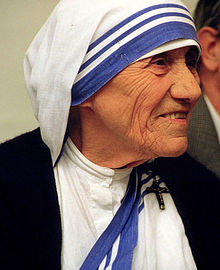31st Sunday in Ordinary Time (Mt 23:1-12)
Like the Scribes and Pharisees, we often place ourselves on a pedestal, believing that we have special gifts or talents that make us superior to others while we conveniently forget that we all have our shortcomings and weaknesses. Or at least we want to forget, so that we don’t have to acknowledge to others that we are not quite as good as we might have them believe. For some, the statement “Lord, it is so hard to be humble, when I am perfect in every way” feels so right and true, but in truth, there is only one who has the right to make that statement… and He died for us on a cross some 2000 years ago.

Blessed Mother Teresa
The word ‘humility’ comes from the Latin word ‘humus’, which means soil and is generally associated with words such as abject, ignoble, of poor condition, not worth much. More often than not we perceive a humble person as meek, stooped over with downcast eyes and a soft, timid voice, trying very hard to never be noticed or recognized. However, this is not the vision offered by Jesus, rather, his is one of a strong sense of self—that begins in humility; that we are in this together and we need and depend on one another, that we must use our gifts for the good of others and the glory of God.
Saint Thomas Aquinas wrote that “The virtue of humility consists in keeping oneself within one’s own bounds, not reaching out to things above one, but submitting to one’s superior.” And Saint Augustine said that God accepts sacrifices only from the altar of humility. We humble ourselves by being ourselves and God exalts us for who we are.
Humility is a gift neither earned nor self-created. When we live courageously in the spirit of communion with others we open ourselves to seeing others from God’s perspective. Humility begins in the knowledge that we belong to God. It is the sense that all of God’s creation is important and that our existence depends on our relationship with others. It is not a matter of denying our own self interest but in seeing how our interests are connected to the well being of others.
Humility does not call for us to reject or disparage our God given gifts nor does it require us to think of our gifts as less valued than the gifts God has given others. God has entrusted each of us with certain gifts and abilities and he expects that we use His gifts to their fullest. God measures each of us on our own merit; it is not a competition. What others achieve is never part of the equation; before God, everyone stands alone.
As I was reflecting on the readings for today I couldn’t help but be reminded of my parents, for they were true examples of humility and holiness. They were both born in the mid-1920s in northeast Missouri, grew up on farms during the depression era; Dad served as a corpsman in the Marine Corp in the South Pacific during World War II, came home after the war and married mom, a day after her 21st birthday.
My mother graduated from high school after 2-1/2 years and attended college for only one year. She read voraciously, taught school for a short while and eventually became an award winning journalist, all while working at home and raising 11 children.
Dad always bragged that he graduated from high-school fourth in his class; neglecting to mention that there were only four in his class. But what he could do with his hands was a wonder to behold. He built a walnut china hutch as a wedding present for one of my brothers…starting from the tree.
They never put on airs or pretended to be anyone but themselves; God was always present in our lives, everyone was welcome in our home; the doors were never locked, and there was always room for more at the table.
When they were killed in a traffic accident, the wake and funeral were attended by more people than our small town of 3000 could accommodate. Their lives and their actions had touched so many through their simple acts of kindness and generosity, even some who they had never even met. They gave of themselves freely, never asking for or expecting anything in return and what they gave was always their very, very best.
My parents taught us that we do not live alone, that we can be proud of who we are while never believing that we are entitled or superior to others. They taught us that the world will become a better place when we freely offer our God given gifts to others and that every gift offered is returned, magnified many times by the grace and gifts of others.
St. Paul, in writing to the Romans, said “I tell everyone among you not to think of himself more highly than one ought to think, but to think soberly, each according to the measure of faith that God has apportioned. For as in one body we have many parts, and all the parts do not have the same function, so we, though many, are one body in Christ and individually parts of one another.”
Jesus tells us that becoming a servant, a child, a humble person, are ways of revealing true godliness. Holiness requires us to discard anything that hides God’s goodness within us.
As human beings we all wish to stand out; to know that we are different, but we need to step down from our pedestals and learn to become servants of God. If we are willing to put our pride aside, our hearts will be filled with God’s grace and love.
As Blessed Mother Teresa, herself a model of great humility, once said, “We can do no great things, only small things with great love.”
